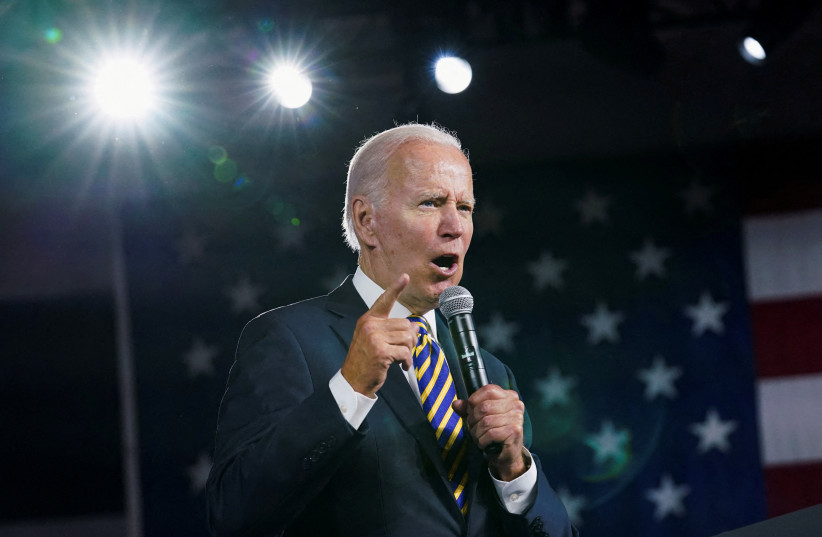US President Joe Biden’s visit to Israel and Saudi Arabia will include some discussions on the Iranian threat.
This is clear from the fact that Israel is showcasing its multi-layered air defenses and that there is talk of a "strategic” partnership with the US regarding Iran. There are also reports about Israel and the US pushing more cooperation with Abraham Accords countries. Beyond that, there are the foreign media reports about Saudi Arabia and the possibility for warmer ties between Riyadh and Jerusalem.
Iran is concerned but is not sure how to handle all the news. Tehran is seeking to host Russian President Vladimir Putin next week. This could potentially mean that Iran is trying to balance the Biden visit. Iran is trying to showcase that it can work with countries that want to unseat the US as a global hegemonic power. This is the messaging Iran is putting out, and one that Turkey, Pakistan, China, Russia and other authoritarian regimes believe in.
What is Iran thinking?
But what is Iran’s regime thinking? It has opposed the concept of a defensive pact between Israel and any Arab states. However, Iran appears to accept as a fait accompli that Israeli ties with several Arab states are growing. These include official ties with Jordan, Egypt, Bahrain, the United Arab Emirates and Morocco. Iran is trying to work via Iraq to destabilize Jordan or at least threaten Amman, in order to blackmail Jordan not to be too close to Israel.
Iran might also consider using proxies in Lebanon, Yemen, Iraq and Syria to continue attacks. But it is treading carefully. On the one hand, Iran is still ostensibly engaged in talks with the West related to its nuclear program. But although Qatar may think these talks are going well, after having met with Iran, there are indications that the US, France and others are not impressed.

Boris Johnson’s fall from power in the UK and Russia’s distractions in Ukraine might mean Iran can’t “heat up” the need for another deal. In fact, Iranian media that are close to the Islamic Revolutionary Guard Corps have published stories mocking the 2015 JCPOA nuclear deal and its architects.
So what are Iran’s media, which reflect the IRGC and the regime, pushing? Tasnim News is discussing the possibility of Israel-Saudi relations. It is also noting that Western media is concerned about growing Iran-Russia ties, and commemorating the 2006 war between Israel and Hezbollah, noting that Israel could be threatened at sea by Hezbollah. At the same time, there is an article noting that the JCPOA was linked to Iran’s “elites” who believed too strongly in the West.
So what is Iran’s media, which reflects the IRGC and the regime, pushing?
REGARDING BIDEN’S visit, Tasnim News has an article with an expert named Sabah Zangeneh discussing Biden’s goals. One goal, the article claims, is to increase Israel’s security and trade with Arab countries. In addition, the article claims that this is linked to energy and arms sales. The article claims that Israel-Saudi ties “go back to the last half century,” and says the goal of the Biden administration could be to make these ties public.
The article notes that Israel’s relations with the UAE and Bahrain are continuing to develop.
“On the other hand, Saudi Arabia has presented several plans for the settlement of the Arab-Israeli conflict, and if it normalizes its relations with Tel Aviv [Jerusalem], practically all of its plans in this regard will be ignored and it will lose its credibility.”
An Arab NATO?
Iran is also gambling on the fact that previous plans for a regional alliance, what some have called an “Arab NATO,” have never emerged. That means Iran believes Egypt and Jordan do not want to be part of any grouping that is perceived as anti-Iran.
The goal of using Zangeneh to discuss the visit is that if Iran is wrong, then the regime can simply move on, while the media used someone else to communicate the regime’s concerns. The article notes that the US cannot implement a regional partnership linking Israel and the Arab states because the US does not recognize how complex the region is.
“There are many obstacles in this field. America does not have the previous authority it once held to exercise its authority or to do this through military force. Of course, in the field of arms sales, America sells its military equipment and Saudi Arabia also buys it, but all these goals are lofty goals that cannot be achieved.”
The writer goes on to note that while normalization will continue, the US president will likely be in office for only another two years. That means, Iran believes, Riyadh might not gamble on any assurances from Biden.
In short, Iran is counting on regional complexity, Saudi caution, and Jordanian and Egyptian foreign policy to prevent the emergence of an alliance in the region that would exclude Iran. Iran is obviously concerned but it is waiting to see what will happen. It also appears to be concerned that it must tread carefully and not provoke a crisis while Biden is here.
That means Iran might be weighing whether it wants to use drones and missiles to attack or threaten Israel, Saudi Arabia or US troops in Iraq and Syria. Iran has used its proxies to carry out some 29 attacks since last October against US forces in Iraq and Syria. Of course, the lack of Iranian messaging does not mean that such attacks will not happen. However, Iran appears concerned about driving Israel and the Arab states into any kind of alliance.
